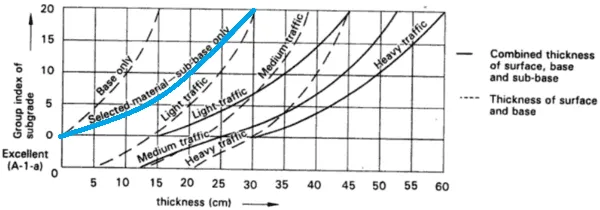A true flexible pavement yields “elastically” to traffic loading. It is constructed with a bituminous-treated surface or a relatively thin surface of hot-mix asphalt (HMA) over one or more unbound base courses resting on a subgrade.
Group Index method of flexible pavement design is an empirical method which is based on the physical properties of the soil sub-grade.

Determination of Group Index Value of Soil Subgrade
Group Index is a number assigned to the soil based on its physical properties like particle size, Liquid limit and plastic limit. It varies from a value of 0 to 20, lower the value higher is the quality of the sub-grade and greater the value, poor is the sub-grade.
By sieve analysis test we can determine Group index value of soil subgrade from below equation
GI = 0.2a + 0.005 ac + 0.01bd
Where,
a= percentage of soil passing 0.074 mm sieve in excess of 35 per cent, not exceeding 75.
b= percentage of soil passing 0.074 mm sieve in excess of 15 per cent, not exceeding 55.
c= Liquid limit in per cent in excess of 40.
d= Plasticity index in excess of 10.
Group Index Method of Flexible Pavement Design
Data Required for Flexible Pavement Design
1. Group index of soil subgrade
Group index value range of different soils is given below
o For good soil – 0 to 1
o For fair soil – 2 to 4
o For poor soil – 5 to 9
o For very poor soil – 10 to 20
2. Traffic volume
It is the measure of Annual average daily traffic, peak-hour traffic. It is denominated by commercial vehicles/day or CVPD.
It is classified in three categories. Based on number of vehicles per day.
If no. of vehicles per days is
o <50 – light traffic
o 50-300 – medium traffic
o >300 – Heavy traffic
Flexible Pavement Design Procedure:
Before going to design the pavement we must know the structure of flexible pavement

Calculation total thickness (T):
From the below chart for given group index of soil subgrade and traffic volume value select appropriate thick curve value of “combined thickness of surface, base and sub-base line” which will give the total thickness of pavement.

(Note: thick line indicates the total thickness value and the dotted line indicates thickness of surface and base)
Calculation thickness of sub-base course (tsb):
From the below chart for given group index of soil subgrade select appropriate curve value of “thickness of sub base only” which will give the thickness of the sub-base course.
The curve highlighted in below diagram

Calculation of thickness of base and surface course (tb & ts):
Thickness of surface and base course = total thickness – sub-base thickness
= T – tsb
The combined value of thickness of base and surface course can be found out from above chart form dotted curve with the help of group index value and traffic volume.
Or otherwise assume the thickness of surface course (ts) = 5 cm
Then we can easily calculate the value of thickness of the base course,
Tb = T-tsb-ts
Cross section of flexible pavement:

The group index method is essentially an empirical method based on the physical properties of the subgrade soil and it does not consider the strength characteristics of soil and is therefore open to question regarding its reliability.


